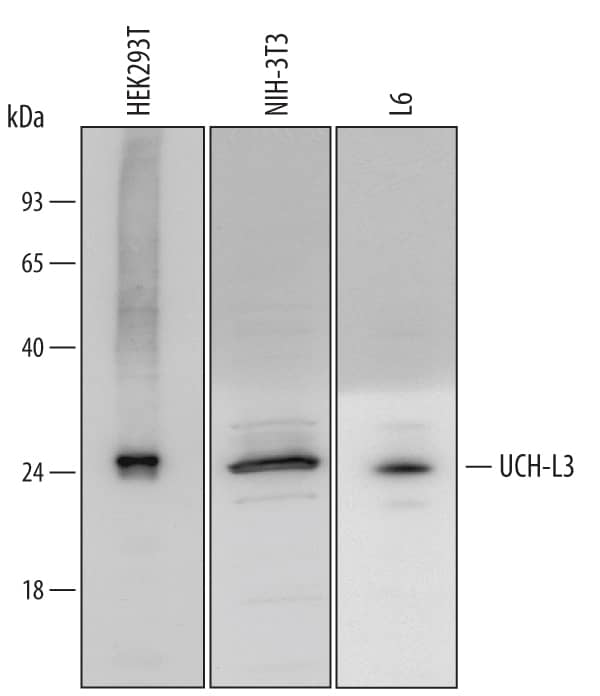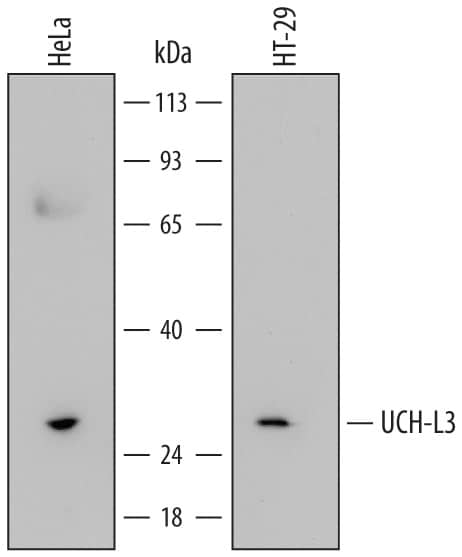UCH-L3 Products
Ubiquitin Carboxyl-terminal Esterase L3 (UCH-L3) is a member of the peptidase C12 family of deubiquitinating enzymes. It is widely expressed with the highest levels being observed in heart, testis, thymus and striated muscle. UCH-L3 is 230 amino acids (aa) in length with a predicted molecular weight of 26.1 kDa. It is composed of a single N-term...
111 results for "UCH-L3" in Products
111 results for "UCH-L3" in Products
UCH-L3 Products
Ubiquitin Carboxyl-terminal Esterase L3 (UCH-L3) is a member of the peptidase C12 family of deubiquitinating enzymes. It is widely expressed with the highest levels being observed in heart, testis, thymus and striated muscle. UCH-L3 is 230 amino acids (aa) in length with a predicted molecular weight of 26.1 kDa. It is composed of a single N-term...
| Reactivity: | Human, Mouse, Rat |
| Details: | Sheep IgG Polyclonal |
| Applications: | WB |
Will be discontinued when existing inventory is gone.
| Source: | E. coli |
| Accession #: | P15374.1 |
| Applications: | EnzAct |
| Reactivity: | Human |
| Details: | Rabbit IgG Polyclonal |
| Applications: | IHC, WB, ICC/IF |
| Reactivity: | Human |
| Details: | Mouse IgG1 Monoclonal Clone #677710 |
| Applications: | WB, IP |
| Reactivity: | Mouse |
| Details: | Rabbit IgG Polyclonal |
| Applications: | IHC, WB, ELISA, IP |
| Reactivity: | Human, Mouse |
| Details: | Rabbit IgG Polyclonal |
| Applications: | IHC, WB, IP |
Recombinant Monoclonal Antibody
| Reactivity: | Rat |
| Details: | Rabbit IgG Monoclonal Clone #007 |
| Applications: | IHC, WB, ELISA, IP |
Recombinant Monoclonal Antibody
| Reactivity: | Mouse |
| Details: | Rabbit IgG Monoclonal Clone #204 |
| Applications: | IHC |
Recombinant Monoclonal Antibody
| Reactivity: | Mouse |
| Details: | Rabbit IgG Monoclonal Clone #153 |
| Applications: | WB, IP |
Recombinant Monoclonal Antibody
| Reactivity: | Mouse |
| Details: | Rabbit IgG Monoclonal Clone #204 |
| Applications: | IHC |
Recombinant Monoclonal Antibody
| Reactivity: | Mouse |
| Details: | Rabbit IgG Monoclonal Clone #153 |
| Applications: | WB, IP |
Recombinant Monoclonal Antibody
| Reactivity: | Mouse |
| Details: | Rabbit IgG Monoclonal Clone #204 |
| Applications: | IHC |
| Applications: | AC |
| Reactivity: | Human |
| Details: | Rabbit IgG Polyclonal |
| Applications: | IHC, WB |
| Reactivity: | Rat |
| Details: | Rabbit IgG Polyclonal |
| Applications: | WB, ELISA, IP |
| Reactivity: | Human |
| Details: | Rabbit IgG Polyclonal |
| Applications: | WB, ELISA, IP |
| Reactivity: | Mouse |
| Details: | Rabbit IgG Polyclonal |
| Applications: | IHC, WB, ELISA, IP |
| Reactivity: | Rat |
| Details: | Rabbit IgG Polyclonal |
| Applications: | WB, ELISA, IP |
| Reactivity: | Human |
| Details: | Rabbit IgG Polyclonal |
| Applications: | WB, ELISA, IP |
Recombinant Monoclonal Antibody
| Reactivity: | Mouse |
| Details: | Rabbit IgG Monoclonal Clone #153 |
| Applications: | WB, IP |
Recombinant Monoclonal Antibody
| Reactivity: | Mouse |
| Details: | Rabbit IgG Monoclonal Clone #153 |
| Applications: | WB, IP |
Recombinant Monoclonal Antibody
| Reactivity: | Rat |
| Details: | Rabbit IgG Monoclonal Clone #007 |
| Applications: | IHC, WB, ELISA, IP |
| Reactivity: | Rat |
| Details: | Rabbit IgG Polyclonal |
| Applications: | WB, ELISA, IP |
| Reactivity: | Human |
| Details: | Rabbit IgG Polyclonal |
| Applications: | WB, ELISA, IP |
| Reactivity: | Mouse |
| Details: | Rabbit IgG Polyclonal |
| Applications: | IHC, WB, ELISA, IP |




![Western Blot: UCH-L3 Antibody [NBP1-86037] Western Blot: UCH-L3 Antibody [NBP1-86037]](https://resources.bio-techne.com/images/products/UCH-L3-Antibody-Western-Blot-NBP1-86037-img0005.jpg)

![Western Blot: UCH-L3 Antibody [NBP2-98339] Western Blot: UCH-L3 Antibody [NBP2-98339]](https://resources.bio-techne.com/images/products/UCH-L3-Antibody-Western-Blot-NBP2-98339-img0005.jpg)
![Western Blot: UCH-L3 Antibody [NBP1-49711] Western Blot: UCH-L3 Antibody [NBP1-49711]](https://resources.bio-techne.com/images/products/UCH-L3-Antibody-Western-Blot-NBP1-49711-img0002.jpg)

![Western Blot: UCH-L3 Antibody (153) [NBP2-90679] Western Blot: UCH-L3 Antibody (153) [NBP2-90679]](https://resources.bio-techne.com/images/products/UCH-L3-Antibody-153-Western-Blot-NBP2-90679-img0004.jpg)
![Immunohistochemistry-Paraffin: UCH-L3 Antibody (204) [NBP2-90680] Immunohistochemistry-Paraffin: UCH-L3 Antibody (204) [NBP2-90680]](https://resources.bio-techne.com/images/products/UCH-L3-Antibody-204-Immunohistochemistry-Paraffin-NBP2-90680-img0003.jpg)